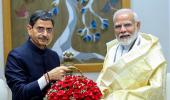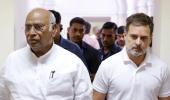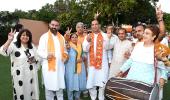'Leave aside the negative fallouts of phraseology like 'urban Naxals' and 'terrorists', both the BJP and the Congress have to re-discover themselves in the context of the 2024 election results, including those of the upcoming ones for Maharashtra and Jharkhand,' observes N Sathiya Moorthy.

When the term 'urban Naxals' began evolving, it strictly referred to militant Left cadres who had purposefully penetrated the ranks and masqueraded as factory labour or were your 'new neighbour' who is aloof and yet had very many guests, who invariably arrived after sunset and were possibly not seen in the daylight hours.
By definition, they provided logistic support to the cadres on the ground, invariably in a neighbouring state.
It included providing safe houses for the cadres and leaders who were being chased by the local police and needed some respite or medical care.
In some cases, the police from Naxal-affected states had unearthed arms dens being maintained by these 'urban Naxals' or taken into custody, wanted leaders who were tired of running and needed to rest, plan and re-launch themselves.
Rarely have these 'urban Naxals' launched any attacks on the hide-out state, or on individuals.
Their tenet was to lie low for the undated day in the future, when alone they should attack.
Sooner than later, those cadres understood that theirs was a secondary and at times sedentary job but which added weight and value to the 'larger cause' which remained undefined and equally unachievable.
But today, the way the ruling Bharatiya Janata Party at the Centre, starting with the all-important Home Minister Amit A Shah, has been branding political rivals, especially the Congress party that is finding ways to resurrect itself, as 'urban Naxals' has consequences.
Equally worse is the way Congress President Mallikarjun Kharge and a few others calling unnamed and unmarked BJP cadres/leaders as 'terrorists'.
If 'urban Naxals' has a definition in the police record books all across the country, starting with the central agencies and paramilitary forces under Amit A Shah's care, the term 'terrorist' has a legal definition.
The Supreme Court of India applied the definition to the Rajiv Gandhi assassination and reversed the TADA trial court's order of death sentence for all 26 accused who were presented for trial.
Parliament or the judiciary is yet to define 'terrorism' and 'terrorist', especially after TADA went the previous POTA way and were made extinct, mainly over the political and police abuse of a piece of legislation that was considered mandatory for the nation's security.
Of course, the question of defining the term in the international arena, which commenced after the 9/11 terror attacks in the US of A, is half-baked, if at all.
Conveniently, nations led by the US settled for an easier terminology to 'identify' terrorists without any formal definition.
In the post-9/11 global scenario, it's 'My terrorist versus Your terrorist' that has gained credence in the West.
Thus, for instance, Russia's Putin is a 'terrorist' under an ICJ ruling, but not Israel's Nethanyahu is not as much when it comes to intent to enforce, because the US does not recognise him as one.

In the contemporary Indian political context, the use of such terms as 'urban Naxals' and 'terrorist' to label electoral rivals is fraught with dangers that cannot be anticipated at the moment.
If government agencies, both at the Centre and in the states, have to take their cue from these leaders, then the number of both categories of militants would see a huge rise that is not supported by evidence on the ground.
In turn, it can also cause misreading, both motivated and otherwise, by external agencies and their governments, about the state of militancy in this country, and the status of human rights (violations) flowing from such misplaced perceptions.
If a BJP state government agency, if not its counterparts at the Centre, began using the new definition for 'urban Naxals', those in non-BJP ruled states could brand every other vocal/militant BJP cadre as 'terrorist'.
Where then do you think this game can end?
In an era where extra-judicial killings and 'encounters' are returning despite strong governmental agencies to monitor such violations and stricter judicial oversight, the 'licence to kill' can lead to avoidable situations.
In such cases, leaders who are now talking irresponsibly may return to pay homage to a 'martyr' of theirs and/or use the unnatural and unwarranted death to beat the political rival with.
If and when the numbers begin increasing, it will go on from social media coverage to something bigger, something that the higher judiciary too cannot ignore anymore.
That is when the news will hit the front pages of more responsible national media, and shock the nation out of its senses.
Any electoral victory won on the martyrdom of an innocent will have socio-political consequences that are too early and too deep to fathom.
The 'Nirbhaya death' in the long run-up to elections 2014 was one death. Thankfully, no 'urban Naxal' or 'terrorist' (as defined by Kharge) was involved.
Even without it all, the text-book crime shook the nation as none other. Imagine, something worse -- and the picture would be complete.

The problem with the ruling BJP after elections 2024, where they could not muster a Lok Sabha majority on their own, is that they lost the script that had served them well in the previous ten years and a host of elections across the country, including two Lok Sabha polls, in 2014 and 2019.
They understand that despite their heaping dirt on the Congress rival, starting with the central-piece Nehru-Gandhi leadership, the party came back, if not with a bang.
Rahul Gandhi overnight became acceptable to new and young voters, who in 2014 had formed the core of the BJP's support base.
His grit and determination to stay and fight back, while not being sung in the open, is what has inspired young voters.
The BJP has nothing or no one in response. They still need to spin their yarn around Narendra D Modi's personality (which remains taller than any other, though diminished in size than in the past 10 years), anti-Congressism and the traditional Hindutva agenda, none of which sells as much as they used to.
The Lok Sabha poll results, especially in Ayodhya-native Uttar Pradesh, bore testimony.
It is the same with the recent Haryana assembly polls, where the gap in the seats won between the victorious BJP and the Congress that lost (not necessarily the hope, unless proved otherwise) is not matched by the poll percentages -- which is less than one.

Leave aside the negative fallouts of phraseology like 'urban Naxals' and 'terrorists', both the BJP and the Congress have to re-discover themselves in the context of the 2024 election results, including those of the upcoming ones for Maharashtra and Jharkhand.
Their past currencies have lost relevance to new generation voters, who showed it as much in the Lok Sabha polls in UP as they had done in the post-demolition assembly elections of 1993.
The BJP leadership of the day, namely, the Vajpayee-Advani duo, like the present-day MoSha duo, learnt their lessons.
Especially after the disastrous post-poll anti-BJP, non-Congress, minority alliance experience between 1996 and 1998, the BJP simply sought a 'vote for change'.
With a lot of pragmatism that came from a fuller understanding of the voter mood of the time, they also begged to 'Give us a chance'.
The voter obliged, but they did not know how to keep it. That is to say, in 2004, their 'India Shining' campaign lost to Sonia Gandhi's 'Aam Aadmi'.
The slogan was so powerful that a decade later, Arvind Kejriwal had no hesitation to hijack the slogan and made it the name and title of his new-found party, AAP.
The same cannot be said of Modi's 2014 slogan, 'Achche Din', as he himself seems to rely still on Congress-baiting and Nehru/Gandhi and Nehru-Gandhi baiting than to seek votes at least now on the identifiable achievements and contributions of his 10-year rule.
This will have consequences for any future leadership of the party in any future elections.
It is on such negativism that the Congress or anyone else, including the party-led INDIA combine can hope to return to power.
Hindutva, and terms like 'urban Naxals', have a shorter shelf-life than believed.
It is especially true of the latter, which only editorial writers in pro-BJP/pro-Modi newsrooms alone can understand.
Unless, of course, Modi believes in P V Narasimha Rao's kind of 'After me, the deluge' phraseology/ideology, from the mid-1990s.
Remember that since the exit of the Rajiv Gandhi government in 1989 and until the advent of Modi on the national scene 25 long years later in 2014, the nation had had governments and leaders that seemed to revel in practising what PVN did not preach, but meant all the same.
Starting with V P Singh, Chandra Shekhar, PVN, Vajpayee (thrice in as many elections, 1996-98-99), H D Deve Gowda, I K Gujral and Manmohan Singh (two terms of full five years each) -- seven prime ministers -- and the picture was/is complete.
N Sathiya Moorthy, veteran journalist and author, is a Chennai-based policy analyst and political commentator.
Feature Presentation: Aslam Hunani/Rediff.com










